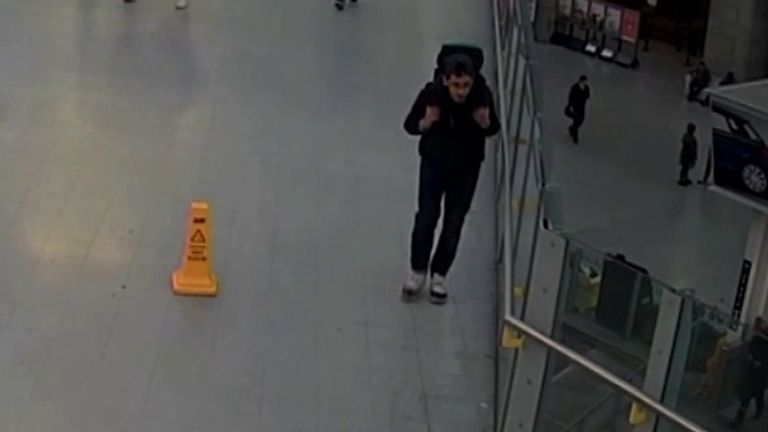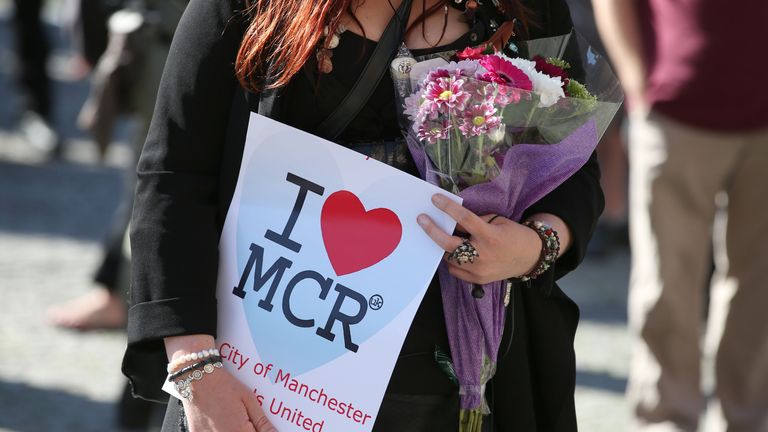Manchester Arena bomber would have detonated 'even if police had intervened', inquiry hears
A barrister for British Transport Police claims an intervention from officers may have increased Salman Abedi's desire to kill.
Tuesday 26 January 2021 20:04, UK
The Manchester Arena bomber would still have blown himself up and killed many of those around him - even if he had been confronted as he lay in wait to launch his attack, a lawyer for police has told the inquiry.
But Austin Welch, on behalf of the victims' families, told the hearing that British Transport Police (BTP) had become "institutionally complacent almost to the point of apathy".
In closing submissions on security, Mr Welch said the officers who were policing the arena were "woefully lacking in experience, seniority, instruction or supervision".
"Their role was reduced to little more than directing people to the exits and trains at the end, rather like ushers in a cinema," he said.
John Cooper QC, for 12 of the victims' families, criticised "distasteful" and "condescending" written submissions on behalf of the force, in which they said the inquiry had "deliberately indulged a certain amount of speculation, partly in an effort to encourage free expression of ideas and feelings, perhaps for therapeutic reasons".
British Transport Police officers failed to patrol the City Room foyer where Salman Abedi launched his attack at the end of the concert, despite instructions to do so from superiors.
Abedi killed 22 men, women and children when he blew himself up in a suicide bomb attack at the end of an Ariana Grande concert in May 2017.
Two officers drove five miles to get a kebab during a two-hour meal break on the night of attack while two others took a 90-minute meal break.
But Patrick Gibbs QC, for BTP, suggested their presence in the City Room foyer would have made no difference.
He said that had a worried parent called Chris Wild reported his concerns to an officer, it is "very hard to say" what an officer "may have done with that report".
But he added: "They may have spoken to the bomber."
Mr Gibbs continued: "What may have happened thereafter is easy to imagine but impossible to say.
"It may have depended on the bomber's state of mind, his resourcefulness, his instructions, the disposition of people within the room at that moment, and so much else besides."
The officer could have been dissatisfied by the bomber's responses, and that could have turned into a "concrete suspicion" which he thought should be passed on to staff in the control room, to stop people leaving the Ariana Grande concert.
"What the bomber may have done in this period, as the conversation continued, as radio messages were passed to and fro is hard to say," Mr Gibbs said.
"One thing, you may think, is most unlikely to have changed in that period is his determination to die and to kill as many innocent people as possible."
Mr Gibbs told the inquiry: "What it comes to, we submit, is if the preceding events had gone differently there would have been a different outcome, but what exactly that outcome would have been, and how many people would have died, and how many would have been seriously injured, and who they would have been is impossible with any confidence to say."
Nevertheless, Mr Gibbs said it was "reasonable" for Sgt Gareth Wilson to expect that if his officers were "unavoidably detained" they would "inform him of the difficulty".
"I know that you will take into account that there may be a difference between what it is reasonable for a supervisor to expect of casual security staff on the one hand and of full-time highly trained professional people on the other," he added.
Closing submissions on arena security continue on Wednesday.





